Alpha Wildlife
Skunk & Squirrel Removal Nashville
Alpha Wildlife Removal Nashville, TN & Surrounding Areas, Veteran-Owned, Skunks, Squirrels, Raccoons & other Critters, Call Now for a Free Quote 24/7!

Alpha Wildlife Nashville
443 Atlas Dr, Nashville, TN 37211
Phone: (615) 434-5331
Email: helpme@alphawildlife.com
Nashville’s Leading Wildlife Squirrel & Skunk Removal Service
Alpha Wildlife Removal Nashville provides expert services to protect your home and ensure peace of mind to you and your loved ones. Veteran-owned and locally operated, we have a vested interest in your protection and the humane removal of wild creatures intruding your home.
Whether you need to remove squirrels from your garage, remove skunks from your porch, or remove raccoons from your attic, we offer comprehensive services to catch and remove the critters along with preventative measures to ensure they do not return.
Animal Complaints in Middle Tennessee
Nashville’s vibrant music scene, rich history, and scenic beauty make it a great place to live and raise a family. However, due to its close connection to nature also means frequent wildlife encounters. We offer full removal services for all of the most common wildlife animals in this area.
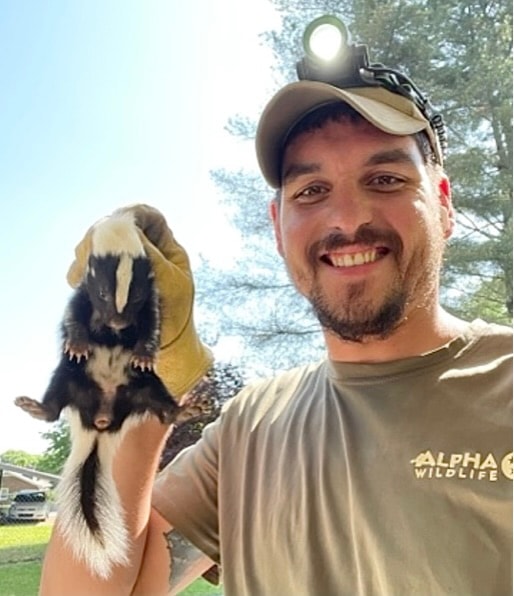
Nuisance Wildlife Removal Process
Inspection & Assessment
During our initial inspection, professional wildlife experts will look for evidence to identify how the animals entered your residence and where they are at now. Technicians typically look for entry points with traces of animal footprints, waste (urine and feces), fur, and damage to your property. Based on our inspection, we will provide you with a free quote on how to resolve your critter issue as quickly as possible.
Trapping Services
Alpha Wildlife Technicians utilize effective trapping and removal techniques to ensure the animals are captured and relocated safely, in accordance with TWRA Guidelines (LINK). Whether you have a squirrel in your attic or a raccoon in your basement, we have the means to catch it and remove it.
Exclusion Services
Our exclusion services not only involve sealing entry points but also include a thorough inspection of your property to identify potential vulnerabilities. We use durable materials to block access and provide advice on landscaping and outdoor practices that deter wild animals from approaching your home.
Damage Repair and Cleanup
Chewed electrical wires, contaminated insulation, and gnawed wood are some examples of damage wildlife can cause inside your home. Beyond repairing physical damage, we also address health concerns by removing contaminated materials that could make your family sick, such as soiled insulation. This comprehensive approach ensures your home is safe and healthy.
Ongoing Monitoring
Ongoing monitoring during the exclusion process helps ensure that the intruding animals do not return, which could save you from costly damage and infestations. Once Alpha Wildlife completes the exclusion, the certified technician will provide a final inspection to ensure all animals are removed and all repairs are completed. This will ensure that there are no further wildlife issues in your garage, basement, etc. This provides homeowners with peace of mind that their house remains protected from unwanted animals.
Emergency Animal Removal
In emergency situations, our team is equipped to respond quickly for animal removals that poses an immediate threat to your safety or property. This includes animals that may be aggressive or have entered living spaces unexpectedly. We prioritize the safety of both our clients and the animals during these urgent removals. We also offer dead animal removal if needed.
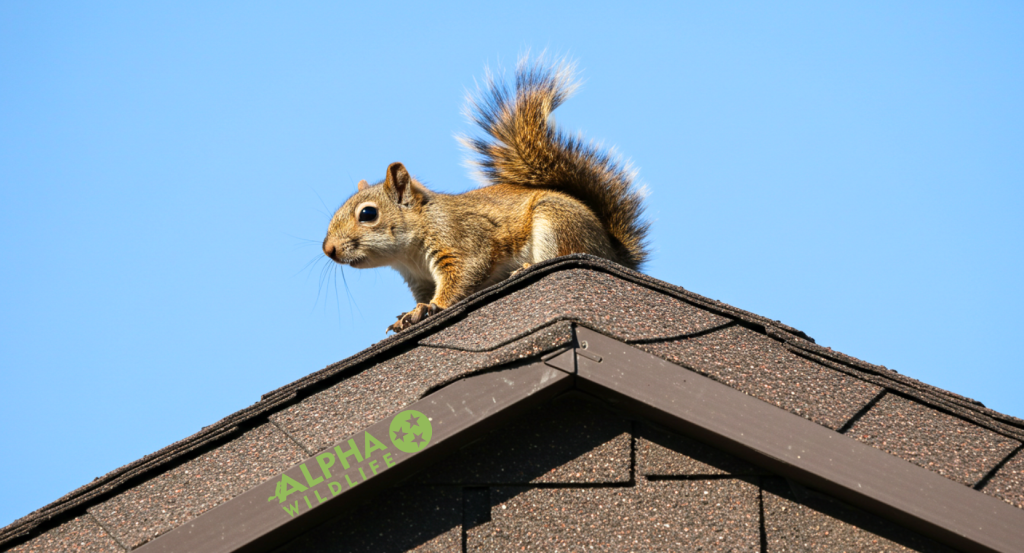
Squirrel Removal
The Eastern Gray Squirrel is a common and highly adaptable species found throughout Middle Tennessee. With their distinctive gray fur and bushy tails, these animals thrive in the city’s parks, wooded areas, residential neighborhoods, and even in your attic. Tennessee’s temperate climate provides an ideal environment for squirrels to forage for acorns, seeds, and other edible items, especially during the fall and winter months when they gather and store food in preparation for colder weather.
While they are generally peaceful and solitary creatures, these critters can become territorial during the breeding season, which typically occurs in the fall and early spring. It’s common for squirrels to chew on electrical wires, insulation, and structural components inside your attic. If you need to get rid of squirrels in the attic, call Alpha Wildlife!
Inspection: Our experts check attics, soffits, and vents for signs of nesting and entry points. We also look for squirrel droppings and chewed materials in and around your home to determine the severity of the infestation.
Trapping: Professional squirrel trapping in Nashville is essential for homeowners dealing with squirrel infestations. Using safe, humane trapping methods, our experts capture them without harm, ensuring that no animals are injured during the process, and none are left behind. Once trapped, they are relocated to a safe environment, far from residential areas.
Exclusion: This process is key to preventing future issues. Our technicians thoroughly inspect the property for gaps, holes, or openings in the roof, attic, vents, and foundation. Once identified, openings are securely sealed using protective materials. Exclusion also includes reinforcing weak spots and addressing all possible access points. This proactive approach helps keep them out and prevents future infestations, offering long-term protection for the home.
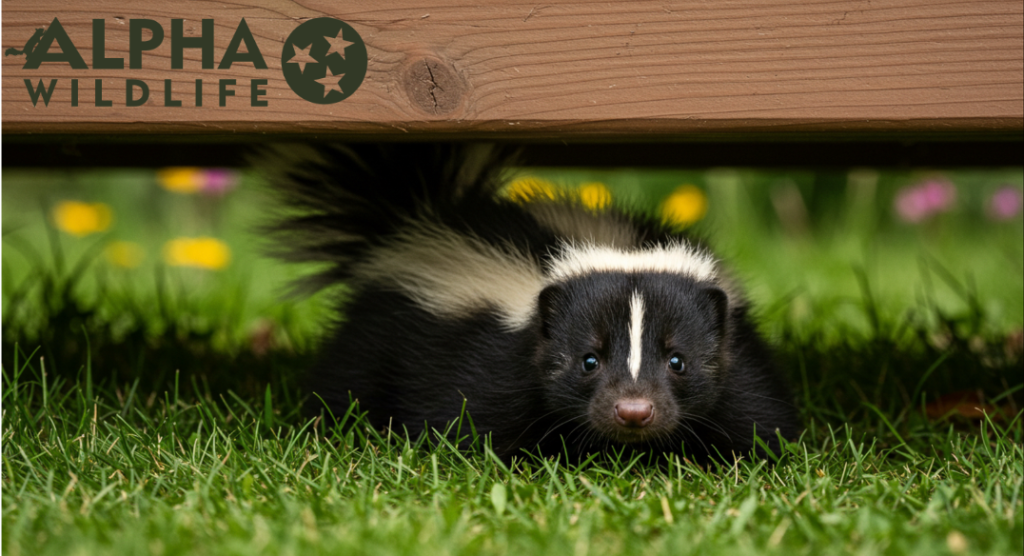
Skunk Removal
Skunk problem? The main two types on skunks found in Tennessee are the eastern spotted skunk and the striped skunk. Skunk mating season typically occurs from Mid-December to early April. During this time, homeowners might notice a change in male and female skunk behavior, such as increased activity or strong odors coming from around their property. These furry visitors are known to burrow near foundation vents, HVAC units, porches, and even under your home, which could lead to structural damage or potential health risks. Since skunks have sharp claws and can spray their foul-smelling liquid up to 10-15 feet, we recommend you always call professional wildlife experts for your skunk control needs. Skunk removal services are available here and surrounding areas.
Inspection: The strong skunk “smell” is a clear indicator that a skunk could be nearby. However, that powerful odor can be detected from up to a mile away, so we look for other signs of skunk activity during our inspections. We evaluate the outside of your home for burrows, tracks, and holes. We also check around the foundation of your home as well as surrounding structures, such as decks and HVAC units, for skunk burrows.
Trapping: We do not recommend homeowners approach skunks due to their spraying abilities and sharp claws, so always call a professional for wildlife removal situations. Getting sprayed is not a fun experience. Skunks can also carry diseases that can be transferred to you or your pets, such as rabies and other diseases. Our wildlife specialists place humane devices near active burrows using bait that attracts skunks while minimizing the risk of capturing non-target animals. We handle all skunk trappings carefully to prevent spraying incidents.
Exclusion: Once the animal removal process is complete, we implement exclusion by installing hardware cloth barriers, sealing foundation gaps, and fixing broken vents around your home and property. Our specialists will also provide you with preventive information to prevent these furry critters from returning. Protect yourself from skunk’s spray, call the professionals today!
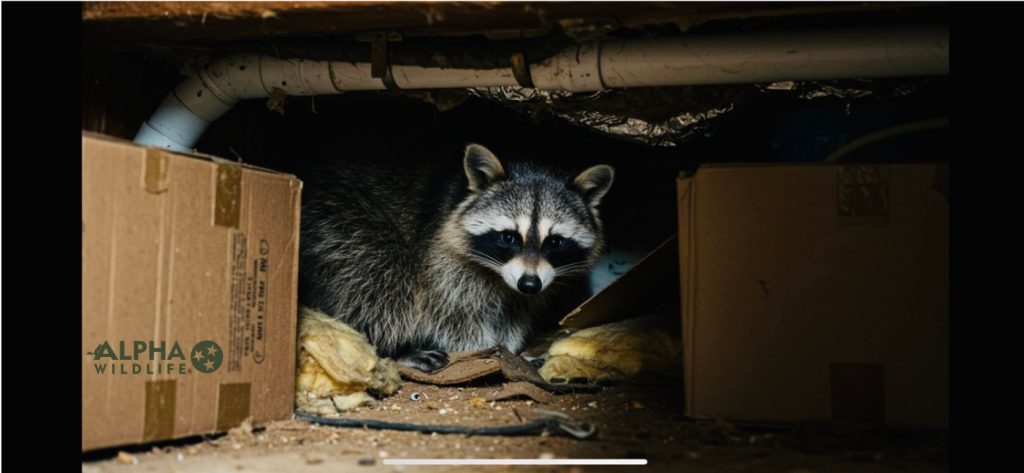
Raccoon Removal
Raccoons are common in this area, and are often spotted in residential areas, parks, and even downtown spaces. These nocturnal creatures are known for their adaptability and are typically seen rummaging through garbage cans and scavenging something edible. Raccoons are particularly drawn to areas with easy access to food and shelter, such as attics, garages, and storm drains. While they are generally not aggressive, raccoons can sometimes pose a nuisance by causing damage to homes or spreading diseases like rabies.
Inspection: Animal Removal Experts are trained to examine indoor and outdoor areas carefully to identify all potential entry points. We check evaluate the roof vents, chimneys, and walls for possible gaps. Raccoon feces, paw prints, broken vents, and torn insulation are typical signs of a raccoon infestation.
Trapping: Based on the inspection, we provide you with a customized raccoon trapping plan for your unique needs. Our technicians strategically place devices in areas where they are most likely to enter and utilize humane methods for capturing them. Our approach ensures an effective solution, minimizing disruption to your daily life while prioritizing the well-being of your home and the animals involved.
Exclusion: After we safely remove the critters, we reinforce entry points with durable materials to ensure long-term effectiveness. We also reinforce vulnerable areas like attics and chimneys, providing additional protection against potential re-entry. In addition, we offer guidance on environmental adjustments to further discourage them from returning. We aim to provide a complete solution that secures your property while promoting a safe and raccoon-free environment.
What’s Hiding in Your Home?
Wildlife animals can find their way into many parts of your home for shelter and food. Identifying these hiding spots is crucial for effective wildlife control strategies.
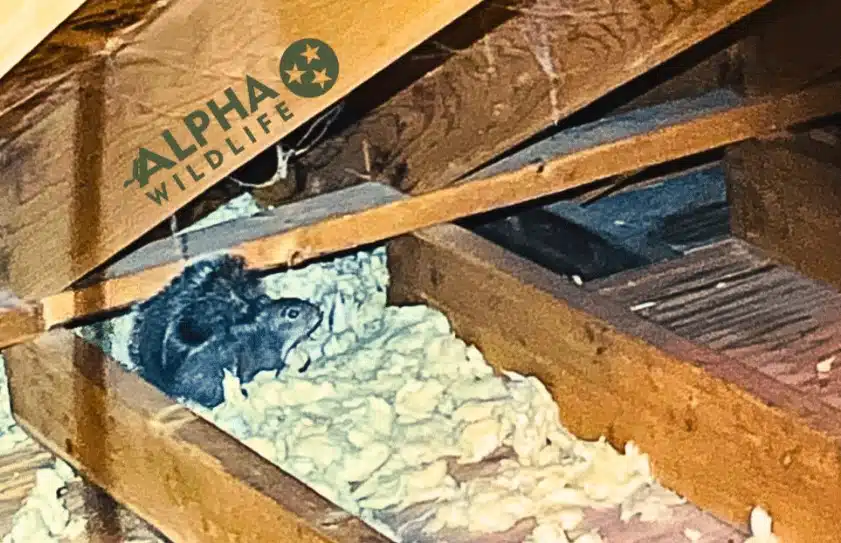
Attic?
Squirrels in the attic is a clear indicator that there are gaps in your roof or vents. Animals can access your home attics through these gaps as well. However, regular inspections and proper sealing of entry points can prevent critters from inhabiting your home and causing issues. Signs of animal incursion include noises, droppings, animal waste, and visible damage to insulation or electrical wires. Trust me, it is not fun having a raccoon in the attic.
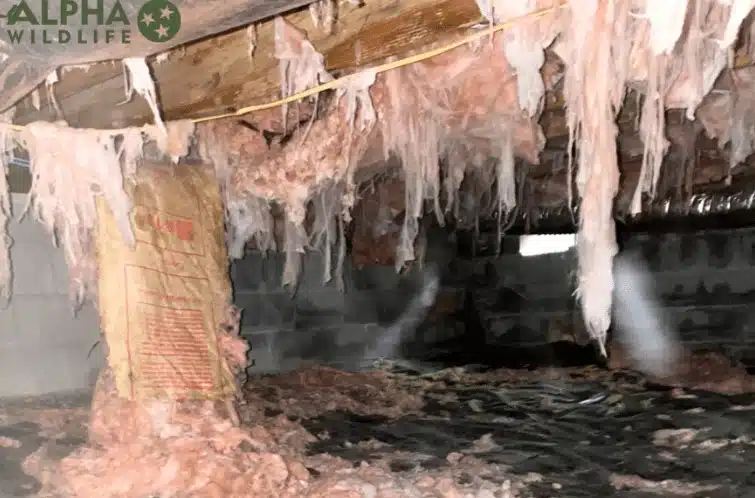
Crawlspace?
Often dark and damp, this area provides easy access to shelter, attracting animals like raccoons and others. Regular inspections and proper sealing can prevent them from making themselves at home and causing damage to insulation materials or the structure itself. Skunks in the crawlspace can bring property damage, possible diseases, and a foul smell to your home. If you smell skunk’s spray coming from your home, call Alpha Wildlife.
Chimney?
Chimneys provide a direct path into the warmth of your home, making them an attractive for flying creatures. Regular inspection, maintenance, and installation of chimney caps can help keep them out and prevent blockages that could lead to fires or other hazards.
Garage?
Garages are often left open or have gaps around doors and windows that allow small visitors, such as skunks, raccoons to enter. However, keeping your garage closed, organized, and storing food securely can deter this activity. If you need to get rid of raccoons in the garage, give us a call.
Basement?
Another common hiding spot for several pest animals, basements often have small cracks or openings that provide entry. A well-sealed and clutter-free basement can help prevent animal infestations.
Walls?
Walls provide hidden and protected spaces for small critters to nest and breed. Identifying and sealing entry points and professional removal services are crucial for addressing wild animals in your home. Signs of critters include scratching noises and droppings around entry points. Alpha Wildlife is here to help you rest easy.
Roof?
Roofs can be entry points for various critters, including squirrels, which can cause significant damage to roofing materials and insulation. Regular roof inspections and maintenance can help identify and seal potential entry points to prevent animals from returning.
Deck?
Is the odor of skunk’s spray coming from around your property? Decks and porches provide shelter and protection from the elements for animals like raccoons and other critters. Installing barriers and keeping the area clean can help remove skunks and prevent them from taking up residence. Skunks under the deck or under your home need to be removed safely and effectively.

Areas We Proudly Serve:
We proudly serve Nashville and the surrounding Middle Tennessee area, including the following cities: Antioch, Belle Meade, Berry Hill, Brentwood, Clarksville, Donelson, Forest Hills, Franklin, Gallatin, Goodlettsville, Green Hills, Hendersonville, Hermitage, La Vergne, Lebanon, Madison, Mt. Juliet, Murfreesboro, Nolensville, Oak Hill, Old Hickory, Smyrna, Spring Hill, Springfield, and White House. Each location has unique wildlife problems and challenges; we’re equipped to handle them all.
Don’t Let Wildlife Take Over Your Home – Act Now!
If you have a skunk problem or issues with other unwanted animal invaders, we offer professional, same day service for your animal control and removal needs. We also offer dead animal removal services if needed. Contact us today to reclaim your home from these nocturnal nuisances. Our expert team is ready to help you with immediate solutions!
FAQs
What is the cost of removing squirrels in the attic?
Squirrel removal cost varies depending on the type and extent of the infestation. Contact us for a personalized quote.
How do I know if I have a squirrel problem in my attic?
Signs include scratching noises, droppings, and visible damage to insulation or wiring. If you suspect an infestation, contact us for an inspection.
Is skunk removal safe for the animals?
Yes, we use humane methods to remove skunks, ensuring their safety and well-being during removal and relocation.
Can skunks on my property be dangerous?
Yes, skunks can pose health risks by spreading diseases such as rabies, leptospirosis, and intestinal roundworms, and they will spray, bite, and scratch when cornered. Their digging can cause significant property damage.
How can I prevent wildlife from entering my home?
Sealing entry points, storing pet food securely, and maintaining a clean and clutter-free environment can help prevent wildlife problems and reduce the risk of animal damage to your home.

